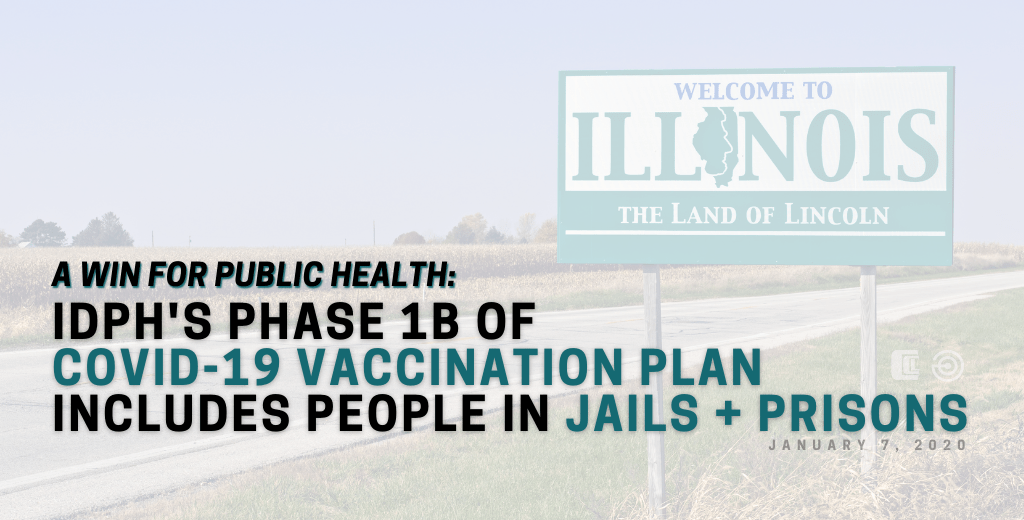A Win for Public Health: IDPH’s Phase 1b of “COVID-19 Vaccination Plan” includes People in Jails and Prisons
On December 4, 2020, the Illinois Department of Public Health (IDPH) released their “COVID-19 Vaccination Plan,” which indicated priority status of special groups – such as healthcare workers and residents of long-term care facilities. Troublingly, people incarcerated and corrections staff – a group most susceptible to contracting COVID-19 – were not listed in the first phase (and were not yet determined to be included within Phase 2 or even Phase 3). This went against evidence from across the United States – and specifically Illinois – showing that incarcerated individuals are among the most vulnerable populations to be infected with and die from COVID-19. Within jails and prisons, contagious diseases spread quickly due to individuals being confined in close quarters, unable to social distance, with little to no access to personal protective equipment, and lack easy access to hygiene products. According to the National Commission on COVID-19 and Criminal Justice, people in jail or prison are four times as likely to be infected with coronavirus as the general population and twice as likely to die from the infection.
On December 21, the Coalition to End Money Bond – including Chicago Appleseed and the Chicago Council of Lawyers – and over sixty other community-based organizations came together to send a letter to Dr. Ngozi Ezike, Director of IDPH, urging the state to prioritize incarcerated individuals in the first phase of the vaccination rollout plan. Like nursing home residents and others living in places where social distancing is difficult, or in some cases impossible, people inside jails and prisons must be in Phase 1 of the vaccination rollout plan to adequately protect public health.
This letter urged the IDPH to “follow the recommendations of nationally renowned public health experts” by giving priority access to the choice of receiving the vaccine to people living and working in all forms of state custody – which include people in the Illinois Department of Corrections (IDOC), county jails, and children in the Illinois Department of Juvenile Justice (IDJJ) and juvenile detention centers (including those detained as part of immigration proceedings), the federal Metropolitan Correctional Center, and locked treatment, developmental, and mental health centers operated by the state.
On December 31, IDPH released their fourth updated “COVID-19 Vaccination Plan,” which includes incarcerated individuals in Phase 1b.
In the last version of the plan, Phase 1b was not set in stone but was expected to include essential frontline workers and groups recommended by ACIP. In the updated plan, there is now a list including: “persons aged 75 years and older, frontline workers (as defined by ACIP and directed by the State of Illinois, and sheltered population, homeless/day programs and inmates.” We applaud IDPH for implementing this guidance, which is hugely beneficial for all Illinoisans, since outbreaks within detention facilities not only directly impact those incarcerated but also contribute to COVID-19 transmission in surrounding communities. As Illinois moves forward with vaccinations, IDPH must follow through with all county health departments in the state to facilitate the administering of the vaccine to all people who choose to get vaccinated held in state prison, jail, or any other form of custody.
For more about how Chicago’s advocacy community has banded together to fight for equity during the COVID-19 pandemic, visit our blog.

